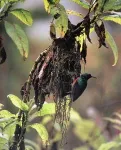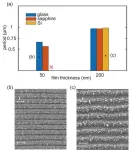(Press-News.org) Birds likely hold smart insights about coexisting in popular habitats– especially as climate change looms. But tapping into that knowledge has a big hurdle: knowing where and how numerous birds live successfully in vast environments.
In today’s biological research journal Proceedings of the Royal Society B, scientists at Michigan State University (MSU) peeled back layer upon layer of big data to tease out real-life answers that until now have been explored mostly in small-scale experiments.
Sam Ayebare, a PhD candidate from Uganda, has led the work that is the first steps to understanding how so many birds can coexist in the vast Albertine Rift ecosystem region in east-central Africa. More birds live in this biodiversity hotspot in than anywhere else on the African continent - a veritable teeming feathered metropolis.
“We want to understand how species – in this case birds – coexist without driving each other to extinction,” Ayebare said. “To protect a species, you must first understand where they are and why.”
Past methods to understand how animals, birds or insects used space relied on experiments in laboratories or on small plots of land. Create a desirable space, then see what creature comes or stays.
But Ayebare, as part of MSU’s Quantitative Ecology Lab, understood more truth was hidden in the vast amounts of data collected by scientists at 519 sampling sites across a montane forest in the diverse region of the Albertine Rift. Scientists strategically selected points of land across huge elevation and environmental gradients and recorded all birds seen or heard over a fixed period of time. That led to the identification of over 6,000 individuals across 129 species.
That observational data was cross referenced with specific information about temperature, rainfall, and databases that track species dietary preferences, activity patterns, body sizes, and use of the forest canopy for food and shelter.
Managing enormous amounts of information from many different sources is like digging into a treasure chest and finding the gems hidden in a huge, complicated puzzle. The Quantitative Ecology Lab, led by Elise Zipkin, an associate professor of integrative biology, pioneers statistical models to unravel some of the world’s most alarming natural mysteries at the intersection of ecology, conservation biology, and the management of biodiversity. The mission: to understand and predict how and why nature is changing, the consequences of those changes, and what can be done to mitigate biodiversity loss.
“We’re interested in the circumstances that allow biodiversity to flourish – what makes species co-existence possible?” Zipkin said. “There’s is a lot of pressure on biodiversity in the modern age. It helps to understand what types of conditions, at very small to very large scales, can facilitate the protection of species.”
By examining new insights into the birds’ habitat with another question and more data, Ayebare and his team teased out where different species were, and how they were managing to coexist. Amongst their findings were that birds partition their habitat use along environmental gradients- temperature, precipitation, and forest vegetation types. Within the prime habitats for various species groups, the scientists could see that birds of similar species will divvy up territory within the habitat – some using the canopy, others staking a claim to lower levels of a forest. The data revealed a sense of the different strategies the birds adopt to survive.
“Species have organized themselves over millions of years,” Ayebare said. “We want to develop ways figure out what they will do next to survive.”
Translating big data into big insights demands tenacity, Zipkin said. “Sam’s familiarity with the area enabled him to really feel the questions of how bird species in the Albertine rift coexist across spatial scales.”
Zipkin is director of MSU’s Ecology, Evolution, and Behavior Program of which Ayebare is a member, along with co-author Jeffrey Doser. “An environmental habitat gradient and within-habitat segregation enable the co-existence of ecologically similar bird species” also was authored by Andrew J. Plumptre of BirdLife International and Cambridge University, Isaiah Owiunji of Kabale University in Uganda and Hamlet Mugabe of Wildlife Conservation Society (WCS) in Uganda.
The work was supported by the National Science Foundation, WCS Graduate Scholarship Program, the Beinecke African Conservation Scholarship, and World Wildlife Foundation’s Russell E. Train Education for Nature Program.
END
Harnessing big data reveals birds’ coexisting tactics
2023-08-16
ELSE PRESS RELEASES FROM THIS DATE:
Six strategies could boost NY City housing by 300,000 units over decade
2023-08-16
Six policies aimed boosting residential housing construction in New York City could spark the production of roughly 300,000 additional new housing units over a decade, according to a new RAND Corporation report.
The additional housing units would represent more than a 160% increase over recent annual housing production levels in the city, according to the report.
Researchers say the surge in housing supply likely would lead to increased affordability through greater competition among landlords for tenants in the short term and an increase in naturally occurring ...
The Journal of Scientific Exploration publishes special issue on the Shakespeare authorship question
2023-08-16
In the issue, ten historians and literary scholars present evidence that casts serious doubts about who actually authored the monumental works credited to William Shakespeare. Suggesting that the name is actually a pseudonym for someone else, this position has been endorsed by numerous artists and scholars over the decades ranging from Walt Whitman and Mark Twain to Sigmund Freud, Tyrone Guthrie (founder of Canada’s Stratford Shakespeare Festival) and Mark Rylance founding Artistic Director of the reconstructed Globe Theatre in London.
Tradition credits a businessman from an essentially ...
In-school occupational therapy creates positive education experiences for kids with autism
2023-08-16
Strong parent-school relationships are central to a child’s learning, development, and wellbeing, yet when it comes to children with autism (ASD), it seems positive relationships are few and far between say UniSA researchers.
In Australia, an estimated 200,000 people are autistic, with autism the largest primary disability group served by the NDIS. Globally, about one in 100 children are autistic.
Lead researcher, UniSA’s Dr Kobie Boshoff, says support is urgently needed in schools to support the learning needs of children with ...
Team compares reanalysis datasets with Advanced Himawari Imager measurements over East Asia
2023-08-16
Today’s weather satellites provide scientists with a unique opportunity to evaluate the abilities of various reanalysis datasets to depict multilayer tropospheric water vapor. So a research team undertook a study to assess multilayer water vapor depiction in six representative reanalysis datasets against the measurements from the Advanced Himawari Imager over East Asia. Because water vapor is important in the formation of clouds and precipitation, it is vital for scientists to better understand water vapor and the biases among various datasets.
Their work is published in the journal Advances in Atmospheric Science on July 29, 2023.
Scientists produce reanalysis datasets when ...
Controlling the source of electromagnetic waves enables control of the period of laser-induced periodic surface structures (LIPSS)
2023-08-16
Since the scientists at Bell Labs invented the world’s first transistor in December 1947, a revolution in microelectronics technology has profoundly affected lifestyles worldwide. As electronics get smaller and smaller, it is a challenge to find an easy, fast, and low-cost way to fabricate micro-nano components. Traditional direct writing fabrication methods such as mechanical scribing, focused ion beam etching, electron beam lithography, multiphoton polymerization, and thermal scanning probe etching are inefficient. Although methods such as nanoimprinting, photolithography, plasma etching, and ...
Immigration slowed in COVID-19 pandemic, but migrant jobs not filled by U.S.-born
2023-08-16
A prevailing narrative about immigration is that migrants displace U.S.-born residents in the workforce, but new research from University of California, Davis, economists shows that’s not the case.
The study, published in the Journal of Population Economics, details how the COVID-19 pandemic led to a decrease in immigration to the U.S. and how jobs often filled by migrants were not filled by U.S.-born residents.
“We found that this drop in immigrants corresponded also to a drop in employment in some specific types of occupations, including accommodation ...
Advancing metasurface manufacturing with water-soluble mold
2023-08-16
When will the protruding rear camera on smartphones become obsolete? The implementation of a metasurface, which completely disregards the properties of light, promises to reduce the thickness of a camera lens to 1/10,000 of a conventional lens. However, despite this advancement, challenges still persist due to high production costs and intricate processes. Nonetheless, a recent study unveiled a “mold” that dissolves in water, enhancing the efficiency of the fabrication process.
A collaborative team led by Professor Junsuk Rho from the Department of Mechanical Engineering and the Department ...
Recreational drugs detected in more than 1 in 10 cardiac intensive care patients
2023-08-16
Recreational drug use may be a factor in a significant proportion of admissions to cardiac intensive care, with various substances detected in 1 in 10 such patients, suggest the findings of a multicentre French study published online in the journal Heart.
Drug use was also associated with significantly poorer outcomes, with users nearly 9 times as likely to die or require emergency intervention as other heart patients while in hospital, and 12 times as likely to do so if they used more than one drug.
Recreational drug use is a known risk factor for cardiovascular incidents, such as a heart attack or abnormal heart rhythm (atrial fibrillation), ...
Young vapers at risk of bronchitis + shortness of breath even if they also smoke
2023-08-16
Young vapers are at risk of bronchitic symptoms and shortness of breath, even if they, or others around them, smoke cigarettes or cannabis, suggests research published online in the journal Thorax.
The findings prompt the US researchers to call for the respiratory effects of vaping products to be included in regulatory oversight.
Latest US estimates indicate that 14% of high school students vaped in 2022. And it’s known that e-cigarette aerosol contains substances that harm the lungs.
Several published studies have reported respiratory symptoms among teen and young adult vapers. But most of these have focused exclusively on e-cigarette ...
Good cardiorespiratory fitness associated with up to 40% lower risk of 9 cancers
2023-08-16
Good cardiorespiratory fitness when young is associated with up to a 40% lower risk of developing 9 specific cancers later on—at least in men—suggests a large long term study published online in the British Journal of Sports Medicine.
These include cancers of the head and neck, food pipe (oesophagus), stomach, pancreas, liver, bowel, kidney, and lung.
Cardiorespiratory fitness refers to a person’s ability to do aerobic exercise, such as running, cycling, and swimming for sustained periods, or even to climb stairs. It's known ...




